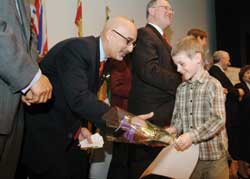Concordians take oath

Karim Boulos, Director of External Affairs in the JMSB, congratulates Cedric Merle, the son of Assistant Professor Philippe Merle (Chemistry & Biochemistry). Cedric became a Canadian citizen with the rest of his family in the DeSève Cinema on April 23. Boulos represented not only the JMSB, but the City of Montreal, as councillor for the downtown borough of Ville Marie.
Photo by Kate Hutchinson
The 60th anniversary of the Citizenship Act was celebrated at Concordia on April 23 when 78 people, 22 of them from Concordia, became Canadians in the DeSève Cinema.
Back in February, citizenship judge Barbara Seal was a guest at the Chinese New Year dinner given by the JMSB, and that’s where the idea of having the ceremony at Concordia was hatched.
An appeal went out to Concordia students, faculty and staff to come forward. Among them was Martin Martens, an assitant professor of Management, who was pleased that being part of the university’s ceremony advanced his file by nearly a year.
“They told me when I applied in November that it would take about 15 months,” Martens said. A native of the United States, he lived here for a number of years on student visas, but now he’s a full-fledged Canadian. Sitting next to him were his Canadian wife, Claire Hilscher, and Diego Cueto, a doctoral candidate in finance from Peru, who also got his citizenship.
A number of dignitaries representing the federal government, the province and the city were on hand to congratulate the new citizens. Marcel Danis, the university’s Secretary-General and Vice-President External Relations, introduced President Claude Lajeunesse, who welcomed them to Concordia and wished them well.
The citizenship ceremony is not elaborate, but it has a touch of formality. The judge is preceded by an officer of the Royal Canadian Mounted Police, in distinctive scarlet jacket and broad-brimmed hat, who barks out “La cour! The court!” Those present stand when she enters and leaves the room to indicate that she embodies the court’s authority.
By coincidence, the court clerk, who explains and records the proceedings, was Jenny Colon, a 2000 graduate of the Applied Human Sciences program.
The oath is straightforward, and is administered (in Quebec) in French first, then English. Judge Seal invited those in the audience who were already Canadian citizens to reaffirm their allegiance to the country (and the Queen), and many of them did. The ceremony ended with the singing of O Canada in English and French, led by Concordia vocal performance student Clayton Kennedy.
Some of the audience members from far older nations must have been struck by the relative youth of their new country.
Until 1947, Canadians were considered British. The 1939-45 war in Europe, in which Canadians fought and died in the thousands, was a catalyst for a newly independent national identity, and Paul Martin, father of the recent prime minister, led the effort to establish the Citizenship Act. During the 1950s, refugees and other immigrants poured into Canada. Between 1947 and 2006, more than six million people became citizens.
Two honorary citizenships have been granted, to Raoul Wallenberg, the Swedish diplomat who saved thousands of Hungarian Jews, and Nelson Mandela, the former president of South Africa.
Here are the Concordians who took the citizenship oath on April 23: professors Philippe Merle, Tracy Hecht, Martin Martens and Bianca Grohmann; students Pavel Schetinin, Jian Tao Wu, Dejan Damljanovic, Bo Gao, Pei Yuan (Steven) Liu, Mohammad Faisal Uddin, Sukhvinder Virdi, Suiling Wang, Ying Hou, Salekul Islam, Sarah Tashin Kakoli, Zhuo Rong Han, Hai Hong Li, Hong Wei Li, Jian Lin, Hasib Ullah and Diego Cueto.